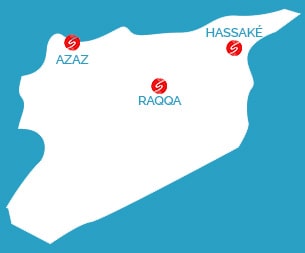In late August 2022, a cholera outbreak broke out in Syria. It started in Aleppo and quickly spread to several cities in northeast Syria. As of 23 September 2022, 5,973 suspected cases have been reported in 9 of Syria’s 14 governorates.
Cholera is contracted by ingesting food or water contaminated with the bacterium Vibrio cholerae. It causes intestinal problems that are sometimes severe enough to lead to dehydration. The disease can kill within a few hours if left untreated. Mortality is highest in children, the elderly and frail individuals.
Outbreaks spread rapidly in areas where people do not have access to clean water and/or good hygiene practices. In Syria, where the population is much weakened and the water and sanitation infrastructure has been devastated by more than 11 years of conflict, the situation could quickly become catastrophic.
To contain the outbreak, SOLIDARITÉS INTERNATIONAL has set up an emergency response: the teams on the ground have intensified the disinfection of water tanks, chlorinated the water supplied to the population, distributed “cholera” hygiene kits containing water purification tablets and promoted good hygiene practices. ”In Al-Hasakah in northeast Syria, our NGO, in coordination with the Syrian Ministry of Water Resources, is chlorinating the water carried by all the tankers entering the city; these operations are taking place 24/7. A total of 56,000 m3 of water has been chlorinated to date by our teams, and 450 trucks are chlorinated every day”, says Marjolaine Bos, SOLIDARITÉS INTERNATIONAL field coordinator in Al-Hasakah.
Our organisation is also actively participating in various inter-NGO coordination mechanisms for the “cholera response”.
“While it may be hard to stop the spread of the outbreak in the areas already affected, we can help limit its spread to regions not yet affected and significantly reduce the health impact for populations already suffering the consequences of a serious and long-lasting humanitarian crisis”, concludes Marjolaine Bos.
Syria
Context and action- 22.1 million inhabitants
- 150th out of 191 countries on the Human Development Index
- 872.261 people helped

